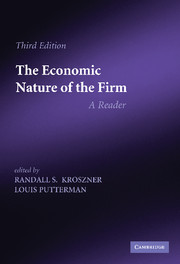Book contents
- Frontmatter
- Contents
- Editors' preface
- Reintroducing The Economic Nature of the Firm
- Part I Within and among firms: the division of labor
- Part II The scope of the firm
- Part III The employment relation, the human factor, and internal organization
- 13 Production, information costs, and economic organization
- 14 Contested exchange: new microfoundations for the political economy of capitalism
- 15 Understanding the employment relation: the analysis of idiosyncratic exchange
- 16 Multitask principal–agent analyses: incentive contracts, asset ownership, and job design
- 17 Work motivation
- 18 Worker participation
- Part IV Finance and the control of the firm
- References
- References
13 - Production, information costs, and economic organization
Published online by Cambridge University Press: 05 June 2014
- Frontmatter
- Contents
- Editors' preface
- Reintroducing The Economic Nature of the Firm
- Part I Within and among firms: the division of labor
- Part II The scope of the firm
- Part III The employment relation, the human factor, and internal organization
- 13 Production, information costs, and economic organization
- 14 Contested exchange: new microfoundations for the political economy of capitalism
- 15 Understanding the employment relation: the analysis of idiosyncratic exchange
- 16 Multitask principal–agent analyses: incentive contracts, asset ownership, and job design
- 17 Work motivation
- 18 Worker participation
- Part IV Finance and the control of the firm
- References
- References
Summary
The mark of a capitalistic society is that resources are owned and allocated by such nongovernmental organizations as firms, households, and markets. Resource owners increase productivity through cooperative specialization and this leads to the demand for economic organizations which facilitate cooperation. When a lumber mill employs a cabinetmaker, cooperation between specialists is achieved within a firm, and when a cabinetmaker purchases wood from a lumberman, the cooperation takes place across markets (or between firms). Two important problems face a theory of economic organization – to explain the conditions that determine whether the gains from specialization and cooperative production can better be obtained within an organization like the firm, or across markets, and to explain the structure of the organization.
It is common to see the firm characterized by the power to settle issues by fiat, by authority, or by disciplinary action superior to that available in the conventional market. This is delusion. The firm does not own all its inputs. It has no power of fiat, no authority, no disciplinary action any different in the slightest degree from ordinary market contracting between any two people. I can “punish” you only by withholding future business or by seeking redress in the courts for any failure to honor our exchange agreement. That is exactly all that any employer can do. He can fire or sue, just as I can fire my grocer by stopping purchases from him or sue him for delivering faulty products.
- Type
- Chapter
- Information
- The Economic Nature of the FirmA Reader, pp. 173 - 196Publisher: Cambridge University PressPrint publication year: 2009
References
- 658
- Cited by



